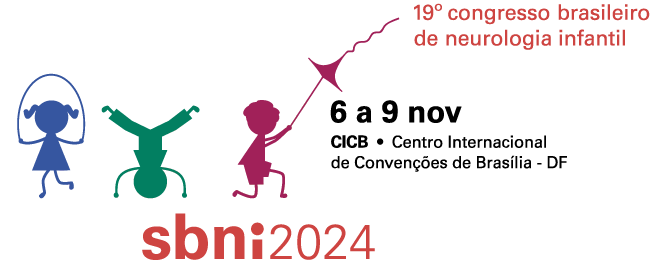Dados do Trabalho
Título
AUTISM SPECTRUM DISORDER BEHAVIOR DUE TO WIEDEMANN-STEINER SYNDROME (WSS): A CASE REPORT
Apresentação do caso único
A 2-year 7-month-old girl experienced developmental delay by the age of 4 months, presenting with postural instability, food refusal, diminished social interaction, and emotional lability. An echocardiogram performed when she was 1-year-old revealed tricuspid valve thickness and mild regurgitation. Initially, she was diagnosed with Autism SpectrumDisorder (ASD) when she was 1-year 6-month-old, based on the symptoms of speech delay, stereotypic movements and decreased social interaction. However, during follow-up, the multi-professional team noted additional dysfunctions such as oropharyngeal, trunk, and lower limb hypotonia, as well as gastroesophageal reflux symptoms, prompting consideration of an alternative diagnosis. Upon evaluation by the neuropediatric specialist in the outpatient clinic, she exhibited wide-based gait, static and dynamic unbalance, postural hypotonia, and facial dysmorphism, along with cognitive and social delays affecting her communication skills. All initial tests, including electroencephalogram, cranial computed tomography, and band-G karyotyping, produced normal results. Subsequently, whole exome sequencing revealed a mutation in the KMT2A gene, leading to the diagnosis of Wiedemann-Steiner Syndrome (WSS).
Discussão
The KMT2A gene is involved in opening chromatin and encodes a protein responsible for the methylation of lysine-4 on histone H3. This process is crucial for the transcription of genes related to neuronal development. Pathogenic variations in this gene are linked to WSS, which affects 1 out of 1000000 live births. WSS is characterized by symptoms such as developmental delay, intellectual disability, hypertelorism, hypertrichosis, short stature, muscular hypotonia, dysphagia, and gastroesophageal reflux. Diagnosis can be challenging due to overlapping features with ASD in 12% of cases, making recognition difficult. Therefore, genetic testing is important for detecting KMT2A gene mutations. Additional tests should be tailored to the patient's specific context, focusing on screening for neuropsychiatric and organic dysfunctions. This patient has been assisted by a multidisciplinary team in an outpatient clinic and is taking risperidone to manage behavioral symptoms.
Comentários finais
The WSS is a rare genetic disease with diverse clinical presentation including ASD. Early diagnosis is crucial to guide treatment and provide genetic counseling, aiming for an improved quality of life for the patients.
Referências
Chan AJS, Cytrynbaum C, Hoang N, Ambrozewicz PM, Weksberg R, Drmic I, Ritzema A, Schachar R, Walker S, Uddin M, Zarrei M, Yuen RKC, Scherer SW. Expanding the neurodevelopmental phenotypes of individuals with de novo KMT2A variants. NPJ Genom Med. 2019 Apr 26;4:9. doi: 10.1038/s41525-019-0083-x. PMID: 31044088; PMCID: PMC6486600.
Di Fede E, Massa V, Augello B, Squeo G, Scarano E, Perri AM, Fischetto R, Causio FA, Zampino G, Piccione M, Curridori E, Mazza T, Castellana S, Larizza L, Ghelma F, Colombo EA, Gandini MC, Castori M, Merla G, Milani D, Gervasini C. Expanding the phenotype associated to KMT2A variants: overlapping clinical signs between Wiedemann-Steiner and Rubinstein-Taybi syndromes. Eur J Hum Genet. 2021 Jan;29(1):88-98. doi: 10.1038/s41431-020-0679-8. Epub 2020 Jul 8. PMID: 32641752; PMCID: PMC7852672.
WIEDEMANN-STEINER SYNDROME; WDSTS. Online Mendelian Inheritance in Man, OMIM® . Johns Hopkins University, Baltimore, MD. Number MIM: 605130:Last updated 6 may. 2018 . URL World Wide Web: https://omim.org/
WIEDEMANN-STEINER SYNDROME, National Organization for Rare Disease, 29 jun. 2023.Available in: https://rarediseases.org/rare-diseases/wiedemann-steiner-syndrome/. Access in: 22 jul. 2024.
Palavras Chave
Wiedemann-Steiner Syndrome; Spectrum Autism Disorder; Genetic Testing
Área
Neurogenética
Autores
DEISIANE NATIVIDADE, FARLEY RODRIGUES, KARINE EMILLY BUENOS, DANIEL LELIS SOUZA, VANESSA CRUZ, THAIANE SOARES
